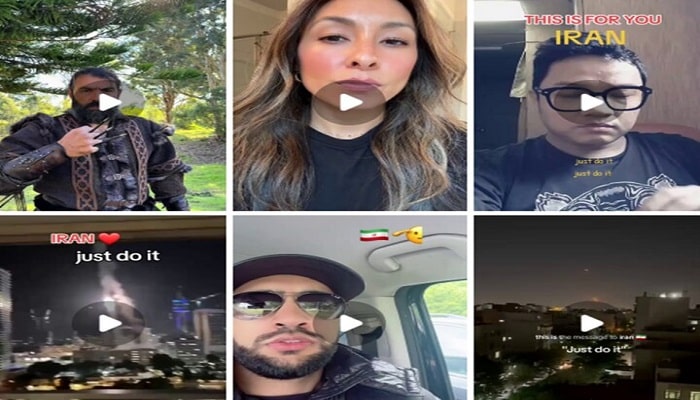PNN – In the midst of the Iran-Israeli war, the “just do it” movement has become a global voice; a cry from Western users who believe that the destruction of Tel Aviv can only be achieved by Iran.
The war that began in recent days with the Zionist regime’s aggression on Iranian soil is not a sign of a new regional conflict, but rather a sign of the culmination of years of strategic patience and military preparedness by the Islamic Republic of Iran. Iran’s heavy and multi-layered attacks on the vital centers of the Zionist regime in the occupied territories, from defense systems to weapons depots and strategic airports, have surprised Tel Aviv on the one hand and, on the other, collapsed the equation that Tel Aviv and its supporters had built for years.
During Iran’s combined missile and drone attacks on the cities of Tel Aviv, Haifa, Ashkelon, etc., which were repeatedly targeted by Iran under the title of Operation “True Promise 3”, the fact has become clear that the warning period is over; the missiles that pierced the Iron Dome systems are not only tools of war, but also carry a message to the world about the vulnerability, defeat, and destruction of the Zionist regime.
In such an environment, the eyes of oppressed nations and users around the world are fixed on Tehran. The “Iran, if you’re listening, just do it” campaign is not born of adventure, but from a global demand; a demand for confrontation, for justice, and for a historic response to decades of oppression.
Read more:
What do you know about the Israeli Weizmann Institute, which was targeted by Iran?
A global cry for justice in the form of a coded campaign
In recent days, a wave of TikTok videos in English have been released with the phrase “Iran, if you’re listening, just do it,” calling on Iran to rain missiles on the Zionist regime and destroy it.
The campaign has become widespread amid rising tensions between Iran and Israel, especially after unprecedented reciprocal attacks. English-speaking users have posted videos calling on Iran to “destroy Israel.” The videos, often accompanied by a distinctive soundtrack, have been reposted hundreds of times.
The campaign has quickly gone viral, as recent missile clashes between Tehran and Tel Aviv have captured the attention of the media and users. The campaign has become so widespread that the chief executive of the Australian Jewish Executive Council called it a “horrifying example of hate speech” and warned that it has “dangerous long-term consequences.” “The public call for the destruction of a state and millions of citizens (Jews, Arabs, Christians) is shocking and unacceptable,” Ryuchin said.
After media contact, TikTok removed most of this content and announced that it was prohibited from publishing calls for violent actions. Although most of this content has been removed, it has so far received more than 3 million views.
This simple phrase carries the heaviest political expectation that can be placed on a country: a response to a historical injustice, an occupying structure, and a bloody chain of genocide. Western users, who were generally accused of being indifferent or distant from Middle Eastern issues, have now spoken out, but not with official literature or institutionalized statements, but with a language born from the heart of the Internet; a language that is intimate, angry, but fundamentally deeply political.
From the perspective of observers, this movement, as well as being a sign of “hate,” is a sign of the collapse of the wall of official censorship of the media and institutions that govern minds. The new generation no longer trusts news network journalists. They have seen the truth on their phones: images of the lifeless bodies of Gazan children, mothers crying, destroyed hospitals, and the heavy silence of the international community. Now, the only voice they feel has the power to answer comes not from the White House or the United Nations, but from Tehran.
Therefore, humor is not the essence of this campaign, but only a tool. Humor is used to relieve psychological pressure, to encode a dangerous message, and to bypass the strict filters of censorship. Here, humor acts as a mask over a deep-rooted demand. Behind this mask is a cry as broad as history: “We saw you; now it’s time to act.”
Making history on Tehran’s shoulders; the world’s hope is revived by the Iranian resistance
The “just do it” movement is no longer just a hashtag or a virtual wave; it has become an unprecedented global demand from the Islamic Republic of Iran; a demand that stems from the world’s tiredness of double standards, the inaction of international institutions, and the Zionist regime’s continuous justification of violence. In such circumstances, the only country capable of responding to this demand, not only militarily but also spiritually and politically, is Iran.
The response of platforms like TikTok and the widespread removal of this content were not to control a “dangerous joke” but to stem a wave that had crossed media boundaries and penetrated the heart of public opinion. In a world full of censorship and thought management, a movement that spreads at this speed certainly carries profound political, cultural, and strategic burdens.
Ultimately, this movement is not just a sign of hatred, but a cry for justice; a world whose leaders have been silent, now its people have spoken, and their words are: “Iran, you are not alone; you are the one we have all been waiting for.”
From their perspective, if Iran plays this role properly with strength, wisdom, and responsibility, the current bloody war will be recorded not as a crisis but as a historical moment in redefining Iran’s place in the global conscience.

